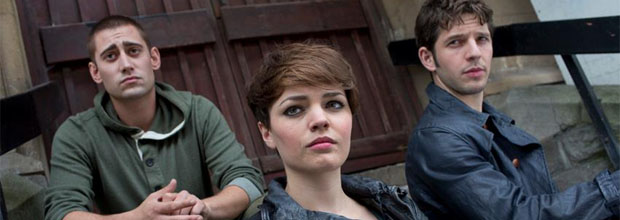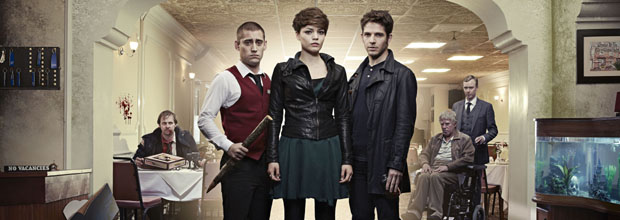
As of the time of writing, we at CultBox have yet to see the final episode of Being Human, and it’s just possible that the BBC may not release it in advance. If an episode preview appears on this site in the next few days, you’ll know that situation has changed. Until then, we’re just as much in the dark as – well, Alex really – and so are free to speculate about where it might go from here.
The obvious answer is: to Hell in a handcart.
The climax to Episode 5 – look away now if you haven’t seen it – saw Alex trapped inside her own coffin, having been despatched there, through a mirror, by Captain Hatch. Now, we’re not too sure about the exact rules of rentaghosting, but we’d be surprised if it could be achieved over long distances. So, with Alex’s grave in Scotland, the likelihood of her simply rentaghosting back into the action in Barry seems remote. In any case, there’s bound to be a rule why the union of ghost and corpse impedes the ghost’s abilities – particularly when there’s a blinking great coffin and six feet of earth in the way.
 We know that, in the Being Human universe, zombies are created when the soul remains with the corpse until some time after the point of decomposition. Maybe the reuniting of corpse and spirit so long after death triggers a similar decomposition, or dissipation at least. As Hatch himself advised Rook, rather too portentously, ‘Don’t you worry yourself about the Ghost. They have a habit of just fading away.’
We know that, in the Being Human universe, zombies are created when the soul remains with the corpse until some time after the point of decomposition. Maybe the reuniting of corpse and spirit so long after death triggers a similar decomposition, or dissipation at least. As Hatch himself advised Rook, rather too portentously, ‘Don’t you worry yourself about the Ghost. They have a habit of just fading away.’
Don’t get us wrong – we don’t for a minute believe that Alex won’t escape that coffin. The girl has unfinished business, after all, and what greater unfinished business could there be than to vanquish the Devil? But if it took the Devil to put her in there, it will take more than a minor plot point to get her out. We’re expecting nothing less than the breakdown of barriers between the worlds to trigger the reappearance of both the men with sticks and rope and, in an eleventh hour return to the fray, Alex herself. All on an admirably-stretched BBC Three budget where impending apocalypse is achieved through picture grading, sound effects and the occasional jump cut.
 Yes, there’s no getting away from it, the biggest barrier to this episode becoming an epic danse macabre is not Alex’s coffin, it’s the budget. Hatch’s attire in the Next Time teaser suggests that they’re going with a Mafia don look to symbolise his increasing ascendance – either that or a very natty ice cream seller – and this seems to be an appropriate way to go. Other shows can create fire-spitting devils out of CGI. But we rather love Being Human for its insistence, conceptual and budgetary, on finding the immortal in the mundane.
Yes, there’s no getting away from it, the biggest barrier to this episode becoming an epic danse macabre is not Alex’s coffin, it’s the budget. Hatch’s attire in the Next Time teaser suggests that they’re going with a Mafia don look to symbolise his increasing ascendance – either that or a very natty ice cream seller – and this seems to be an appropriate way to go. Other shows can create fire-spitting devils out of CGI. But we rather love Being Human for its insistence, conceptual and budgetary, on finding the immortal in the mundane.
More than many comparable shows – though not perhaps Russell T Davies’s The Second Coming, with which it shares some similarities – this is a programme that needs to play out the ultimate battle between good and evil against a backdrop of dirty dishes and cleaning rotas. Being Human, at heart, has always been about friendship, and if the friendship between the three leads isn’t ultimately affirmed by this final episode, it won’t feel like the same programme.
 Sure, we’ve seen Tom sharpening his stakes and insistent on revenge against Hal for betrayals real and imagined. We know that Hal has turned native in spectacular and appalling style – the next episode synopsis [spoilers] suggests that the people he slaughtered in the pub may have been more than just murder victims; they may have been vampire recruits [end of spoilers].
Sure, we’ve seen Tom sharpening his stakes and insistent on revenge against Hal for betrayals real and imagined. We know that Hal has turned native in spectacular and appalling style – the next episode synopsis [spoilers] suggests that the people he slaughtered in the pub may have been more than just murder victims; they may have been vampire recruits [end of spoilers].
We’re also painfully aware that there’s one betrayal Tom has yet to learn about: Hal’s murder of Larry Chrysler. But while everything may be pointing to a full-on war between Hal and Tom to provide the energy on which the Devil feeds, we’d be certain that the love these two men feel for each other will be the means to their redemption. We can all think of those tv dramas which have ended with the massacring of most of the cast, or the suicide of the lead, or the appearance of a demonic alter ego in a cracked mirror. But we’d like the final scenes of Being Human to be domestic and dingy and beautiful.

Again, Russell T Davies’s The Second Coming is the model here – although we’d be surprised if Being Human chose, as Davies did, to posit the existence of a world without religion. Part of the cleverness of Hatch’s characterisation has been that the Devil has been seen in a supernatural rather than a religious context, and has been depicted in human terms as an embodiment of malice and spite. The means to his imprisonment, we were shown in the first episode, is the ‘trinity of the bloods’ of vampire, ghost and werewolf – a rather satisfying bit of hokey nonsense that is just far enough removed from the symbolism of the Eucharist to avoid real offence, even though the ghostly necromancer of Episode 1 does seem to drink from the goblet containing the same (posing the question of how a ghost is able to drink, or indeed bleed).
 It’s all lurid stuff, but when you’ve got no less a figure than the Devil as your Big Bad, and you’re looking to find a way of defeating him, there is potential controversy in it. If the clue-is-in-the-title premise is that this is a programme committed to exploring the human condition, then to eliminate completely the figurehead and personification of the darker side of our nature would be to suggest that the battle which has sustained five series of Being Human – between innocence and corruption; between decency and decay – is won. And that’s just not human at all.
It’s all lurid stuff, but when you’ve got no less a figure than the Devil as your Big Bad, and you’re looking to find a way of defeating him, there is potential controversy in it. If the clue-is-in-the-title premise is that this is a programme committed to exploring the human condition, then to eliminate completely the figurehead and personification of the darker side of our nature would be to suggest that the battle which has sustained five series of Being Human – between innocence and corruption; between decency and decay – is won. And that’s just not human at all.
So – where does this leave us? Well, we’ll eat our hats if Hal, Tom and Alex don’t form their own blood trinity against the Devil. Tom has already helpfully sampled his blood, after all, albeit for a different purpose. But we’d be surprised if this alone was sufficient to defeat the Devil. Much as we’ve enjoyed the minor-key pleasures of Being Human – the domino-laying and Gilbert and Sullivan singing – the series finale is a chance to play with the bigger themes of corruption, damnation, redemption and sacrifice.
 Some characters, we know, are already damned. Hatch has been brutally explicit to Rook about his own chances of salvation. So, much as we like Rook, we are fully expecting the wrong door to open for him – an eternal judgement on what happens when the (literal) pen pusher proceeds with no care and misguided responsibility. Possibly, he might just be in the wrong place at the wrong time when the Trinity require a human body to contain the Devil in.
Some characters, we know, are already damned. Hatch has been brutally explicit to Rook about his own chances of salvation. So, much as we like Rook, we are fully expecting the wrong door to open for him – an eternal judgement on what happens when the (literal) pen pusher proceeds with no care and misguided responsibility. Possibly, he might just be in the wrong place at the wrong time when the Trinity require a human body to contain the Devil in.
It would be a gruesome and pathetic image to see Rook, wheelchair-bound, living out his days in a seedy hotel, resentful of his reduced position in society and splenetic about the declining standards of a world which cares for neither order nor routine. But there must be other characters, too – even especially characters who are in blood stepped in so far – who will be required to make sacrifices of their own.
 If, following the Box Tunnel Massacre, it took Mitchell a series to realise that his greatest service to the world would be to leave it, could Hal go on the same journey, following his own act of devastation in the pub, within one episode? Might Tom’s werewolf blood have a third possible use as an effective cyanide pill?
If, following the Box Tunnel Massacre, it took Mitchell a series to realise that his greatest service to the world would be to leave it, could Hal go on the same journey, following his own act of devastation in the pub, within one episode? Might Tom’s werewolf blood have a third possible use as an effective cyanide pill?
With so many questions like this to play with, it would seem wrong for this episode to do the final thing beloved of last episodes – bring back old characters – although we’d put in a plea for Natasha if we could. The new Trinity of Hal, Tom and Alex has been so successful, they need their own moment in the sun, without the shadow of previous regulars coming over them. Farewell, then, to a brilliant series. Is it wrong to say that next Sunday both can’t come soon enough and, we wish, wouldn’t come at all?
What are your hopes for the finale? Let us know below…
> Buy the complete Series 1-4 boxset on Amazon.
Watch the Series 5 trailer…

